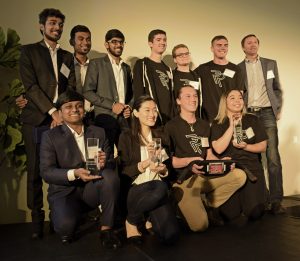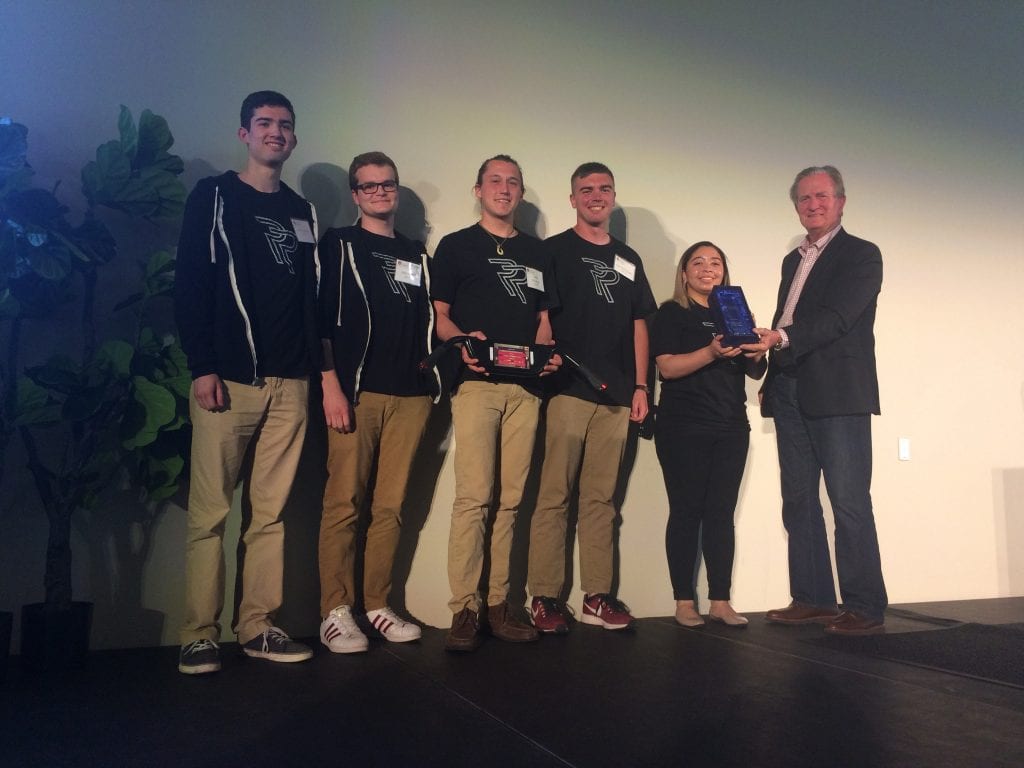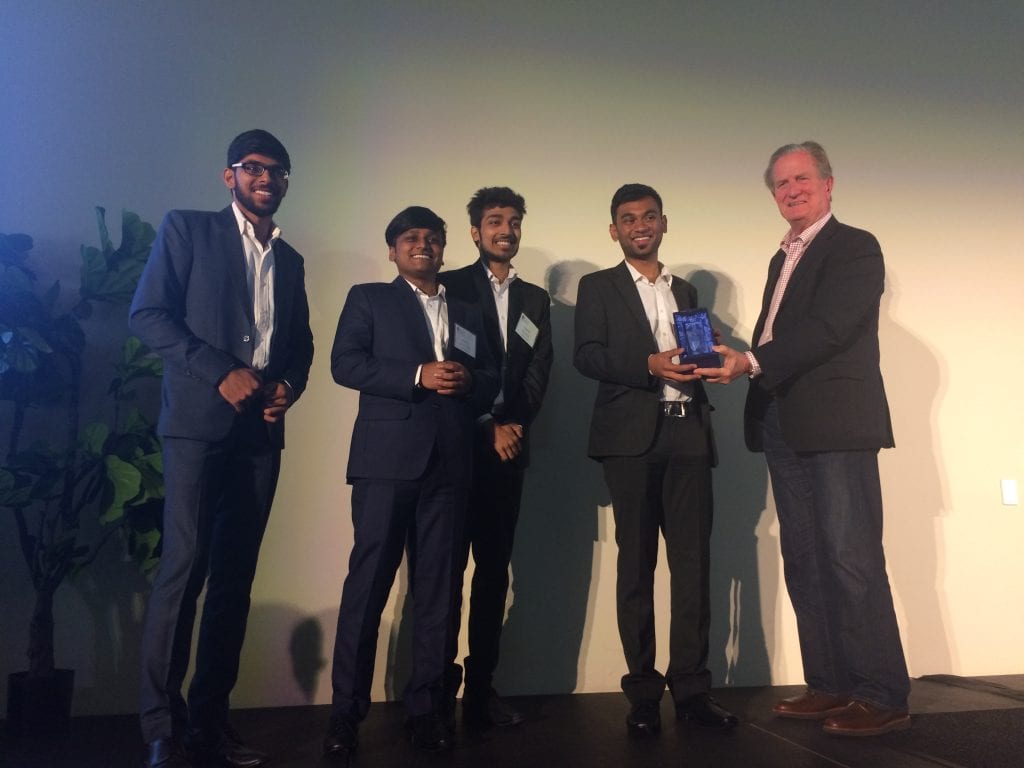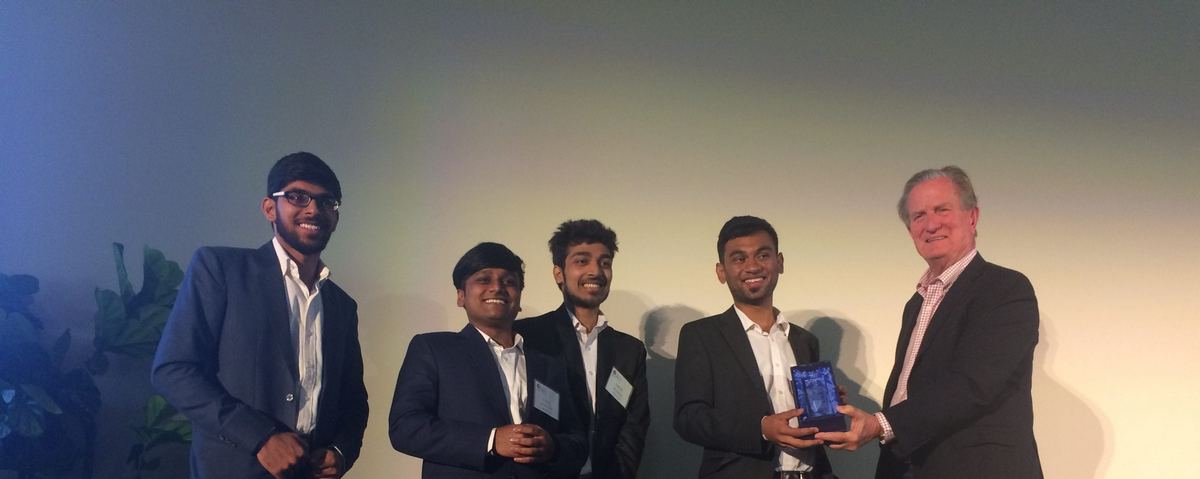
April 18, 2018, Stanford, CA — The Stanford Center on Longevity today named “Ride Rite,” a student entry from Virginia Tech, as the first-place winner of the 2017-2018 Design Challenge competition. The team presented their unique computer-integrated bicycle handle to win the $10,000 grand prize, beating out over 75 entries during the course of the competition. The Ride Rite design includes features such as a blind spot warning, navigational information, fall detection and automated reporting to an emergency contact that are intended to allow older adults to continue biking longer and more safely.
The second-place winner was “Gesturecise” from the Indian Institute of Technology in Guwahati and third place went to “Gather” from San Francisco State University.
This year’s Design Challenge competition was focused on designs that promote lifelong healthy behaviors. The competition is open to all university students from around the world who want to design products and services which optimize long life for us all. All finalists receive $1,000 to build a prototype and travel expenses are covered to bring the teams to Stanford University to present their designs to a panel of renowned industry, academic, and government leaders. Additionally, finalists spend the day after the competition at the Stanford Graduate School of Business to receive entrepreneurial guidance on taking their product/service to market.
Target is a platinum sponsor of the challenge. “At Target, we believe great design has the power to simplify our guests’ lives and solve everyday problems, in addition to offering inspiration and fun. Each of the eight finalists clearly took this to heart and presented thoughtfully crafted product and service ideas with real potential to make a positive impact. We wish Ride Rite and the other finalists the best of luck in bringing their ideas to life,” said Laysha Ward, executive vice president and chief external engagement officer, Target.
Here’s a closer look at this year’s winners and finalists
- FIRST PLACE: RIDE RITE
Virginia Tech University
Ride Rite is a bicycle handlebar designed for older adults who have started to lose confidence in their ability to safely go on bike trips. The handlebars sweep backwards slightly to decrease the distance that the user has to reach to grip them. An integrated computer provides a number of features; including navigation, brake lights, blind spot warnings, and an emergency system that automatically detects falls and contacts a person of the rider’s choice if the rider does not respond to prompt for status after a fall.
- SECOND PLACE: GESTURCISE
Indian Institute of Technology Guwahati
Gesturecise detects body gestures through a computer webcam and prompts the user to stretch and move if they have been sedentary for a long period. It uses negative reinforcement to facilitate behavior by locking the screen if user does not perform the exercise. Its artificial intelligence features detect if the user is performing the exercises at regular intervals. By giving cues through adjusting screen brightness, it gives users the freedom to decide when to exercise. It also gives suggestions for specific exercises, and learns the best and most suitable exercises for the individual.
- THIRD PLACE: GATHER
San Francisco State University
Gather is a universal garden helper designed to allow people of all ages, abilities, and disabilities to garden and to promote social engagement for a happier and healthier lifestyle. The helper takes the form of a movable cart that incorporates support for walking and sitting, storage for gardening tools and a modular design that allows the gardener to configure the cart to their own particular needs. The product was named “Gather” to inspire people to gather around the device, promoting social engagement for its users.
COMPLETE LIST OF FINALISTS
Folks Kitchenware, National University of Singapore
Kitchenware that empowers the blind to cook with confidence and dignity via tactile cues.
Gather, San Francisco State University
A device that facilitates gardening for all ages and abilities and promotes social engagement for a happier and healthier lifestyle.
Gesturecise, Indian Institute of Technology Guwahati
An AI-enabled desktop application which detects body gestures and uses exercises as a screen unlock device, building physical activity into the workday.
Jowalk, National Cheng Kung University (Taiwan)
A platform matching retirees to busy dog owners to help walk the dogs and trigger lasting connections in their communities.
Posture Master, University of Pennsylvania /Washington and Lee University
A personalized, adaptive learning app that uses advanced facial and body recognition technology to monitor posture in real-time and suggest corrections.
Ride Rite, Virginia Tech University
A bicycle handlebar and interface that promotes a safe biking experience and practices for a broad range of individuals.
Salivr, Brunel University (London)
A domestic saliva testing device which detects and monitors user’s vitamin levels on a daily basis to encourage healthy eating.
Seven Bridges, San Francisco State University
A platform connecting generations to foster independence and help overcome the dangers of isolation in older adults and teens.
We are grateful for the guidance and support of industry leaders who make the Design Challenge possible, as well as experts who volunteer their time to serve as judges for the design submissions. Thank you to our sponsors and judges!
PLATINUM SPONSOR
Target
GOLD SPONSORS
Halbert Hargrove
Fidelity
Lixil
Mercer
SILVER SPONSORS
Davis Phinney Foundation
Eskaton
Home Care Assistance
JUDGES
James Landay, Professor of Computer Science, Stanford University
Todd Murch, President & CEO, Eskaton
Naoko Shirota, Director of Business Intelligence, Home Care Assistance
Ned Spieker, Chairman of Continuing Life Communities
Sheela Sukumaran, Technology Industry Leader, Mercer
Erwin Tan, Director of Thought Leadership in Health, AARP
Christi Rager Wise, Health Solution and Innovation, Fidelity Investments
Barbara Yeager, Research Program Manager at The Davis Phinney Foundation
ENTRY JUDGES
Sunanda Agarwal, Managing Director, Patriva
Marsha Vande Berg, Former Chief Executive Officer, Pacific Pension Institute
Dawn Carr, Assistant Professor, Florida State University
Steven Charlap, CEO, GeneYes
Mark Clapper, Emeritus, Kaiser San Diego Orthopaedic Department
Mike Dorsey, Investor and Advisor, Dorsey Capital Partners
Aishetu Dozie, Fellow, Stanford Distinguished Careers Institute
Jeannine English, Fellow, Stanford Distinguished Careers Institute
Amy Gerstein, Executive Director, John W. Gardner Center for Youth and Their Communities, Stanford University
Robert Haddock, Fellow, Stanford Distinguished Careers Institute
Mary Hulme, Founder, Moonstone Geriatrics
Carol Hymowitz, Visiting Scholar, Stanford Center on Longevity
Pradeep Jotwani, Fellow, Stanford Distinguished Careers Institute
Glenn Kaplan, Executive Creative Director, Omni-channel Marketing Communications
Barry Katz, Professor of Design, Stanford University
Julia Randell Khan, Fellow, Stanford Distinguished Careers Institute
Surya Kolluri, Manager of Policy and Market Planning, Bank of America Merrill Lynch
Jean-Jacques L’Hénaff, Vice President of Design, Lixil, American Standard Brands
Dianne Millner, Fellow, Stanford Distinguished Careers Institute
Colin Milner, CEO, International Council on Active Aging
Dana Muriello, Entrepreneur in Residence, Ulu Ventures
Nag Odekar, Vice President and Head of Marketing, Great-West Financial
Abhijit Patwardhan, Fellow, Stanford Distinguished Careers Institute
Sheri Peifer, Chief Strategy Officer, Eskaton
Goran Puljic, Fellow, Stanford Distinguished Careers Institute
Joan Salwen, Fellow, Stanford Distinguished Careers Institute
Greg Shaw, Director of International and Corporate Relations, International Federation on Ageing
Naoko Shirota, Director of Business Intelligence, Home Care Assistance
Donna Slade, Fellow, Stanford Distinguished Careers Institute
Liz Snowden, Fellow, Stanford Distinguished Careers Institute
Reece Soltani, Social Entrepreneur, Food Security, AARP Foundation
Yvonne Sonsino, Partner, Mercer
Ned Spieker, Chairman of Continuing Life Communities
Dan Trigub, Healthcare Partnerships, Lyft
Barbara Yaeger, Research Program Manager, The Davis Phinney Foundation
Austin Yoder, Associate Director, Stanford Center for Entrepreneurial StudiesJeff Makowka, Director of Market Innovation, AARP
Laurie Orlov, Founder, Aging in Place Technology Watch
Sheri Peifer, Chief Strategy Officer, Eskaton
Connie Carpenter Phinney, Board Member, Davis Phinney Foundation for Parkinson’s
Lily Sarafan, Chief Executive Officer, Home Care Assistance
Greg Shaw, CEO, Home Care Assistance
About the Design Challenge
The Stanford Center on Longevity Design Challenge is a global competition aimed at encouraging students to design products and services to improve the lives of people across all ages. Established in 2013, the Challenge is focused on ways to motivate and empower people in their daily lives both inside their homes and in their community, particularly as they remain healthy and vigorous long past the traditional beginning of retirement.
For more information, visit http://designchallenge.stanford.edu
The challenge is made possible by generous sponsorship from a number of companies and foundations. Lead sponsorship is provided by Target. Additional financial support has been provided by Fidelity, Halbert Hargrove, Lixil, Mercer, Davis Phinney Foundation, Eskaton, and Home Care Assistance.
About the Stanford Center on Longevity
The mission of the Stanford Center on Longevity is to redesign long life. The Center promotes the acceleration and implementation of scientific discoveries, technological advances, behavioral practices, and social norms so that century long lives are healthy and rewarding. Founded in 2007 by Laura Carstensen, PhD and Thomas Rando MD, PhD, the Center works with more than 150 Stanford faculty, their students and research staffs, as well as leaders from industries, thought leaders, and policy makers to develop workable solutions for urgent issues confronting the world as the population ages. For more information, visit http://longevity.stanford.edu
Follow the Stanford Center on Longevity @StanfordLngLife on Twitter and via our Facebook page for more updates — including announcements on “Contributing at every age: Design for intergenerational impact”, the theme for our 2017-2018 Design Challenge!


For more information or questions, please contact Halbert Hargrove at hhteam@halberthargrove.com.


